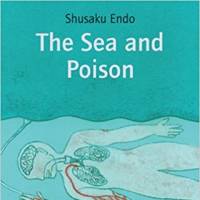This 1957 novel has at its heart Shusaku Endo's fascination with a seemingly tranquil and civilized postwar Japan still traumatized by the horrors of the Pacific War. Even a harmless-looking gas station attendant might be a grizzled war veteran involved in brutal killings on the front line little more than a decade before.
The Sea and Poison, by Shusaku Endo, Translated by Michael Gallagher.
167 pages
TUTTLE, Fiction.
On the home front, the combination of indiscriminate wartime bombing, government propaganda and increasing insensibility to death had caused a loss of moral compass that led to one of the most notorious crimes of the war: the vivisections conducted on captured American airmen at a Fukuoka hospital in the name of medical research.
Endo takes us on a journey into the lives of those involved in the "experiments" — from doctors to nurses and orderlies — and puts his knowledge of places such as colonial Manchuria and Rokko in Kobe to expert use in constructing the characters' hinterlands.
The novel's insight grows when viewed in the arc of Endo's long, distinguished career. Its chief focus is Suguro, a doctor tried for his involvement in the vivisections, and Endo's interest lies in probing how ordinary people ended up being involved in atrocities. Twenty-nine years later, in his masterpiece "Scandal" (1986), Endo applied the same name, "Suguro," to his own alter-ego, recognizing that the capacity for connivance in acts of cruelty and depravation lurks deep within us all.
Read archived reviews of Japanese classics at jtimes.jp/essential.



